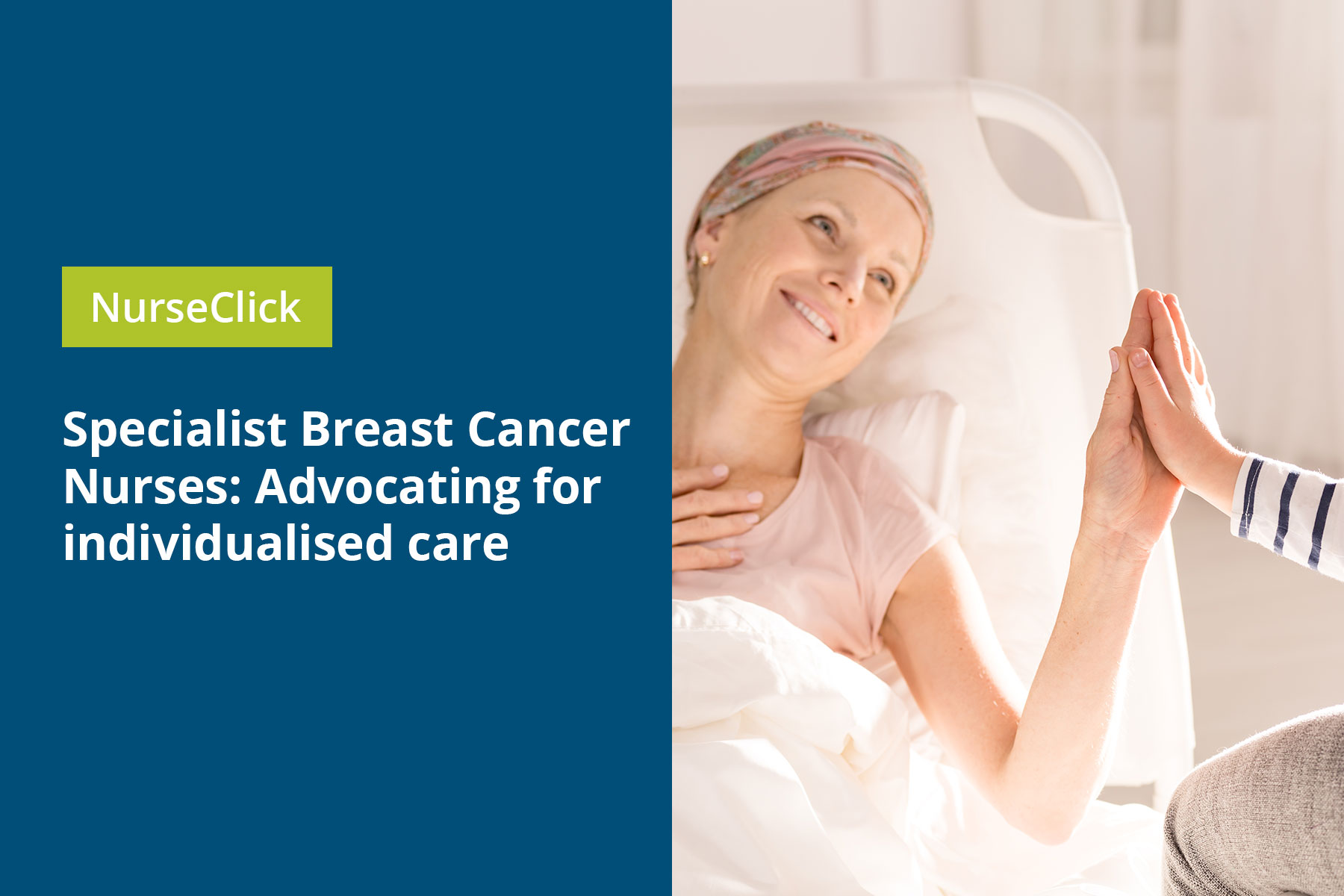October is Breast Cancer Awareness Month, a time for raising awareness, fostering support, and advancing education about breast cancer. As the number of breast cancer survivors is increasing, accessing supportive care has become crucial for individuals to recover and maintain their quality of life (Breast Cancer Network Australia, n.d.). ‘Living Well, Your Way’ is Breast Cancer Network Australia’s (BCNA) theme for Breast Cancer Awareness Month this year. Specialist Breast Cancer Nurses (SBCNs), who are highly skilled, experienced, and trusted professionals, play a pivotal role in this journey. They provide safe, tailored support and guidance that aligns with each individual’s unique needs and preferences. This article explores the role of SBCNs and their contribution to supporting individuals to embrace the theme of ‘Living Well, Your Way,’ with a focus on care models and support systems.
‘Living Well, Your Way’
A diagnosis of breast cancer and its course through treatment, recovery, recurrence, and survivorship or palliative care brings with it biological and physical challenges as well as psychological distress (Wang & Feng, 2022). This impact reaches beyond the patient, influencing their entire social network. There is no one way to ‘live well’ during or following a diagnosis of breast cancer (Breast Cancer Network Australia, n.d.). Individuals diagnosed with breast cancer report increased levels of physical, psychological, social, cultural, spiritual, and financial distress that can persist into survivorship with negative implications for quality of life, treatment adherence and prognosis (Wang & Feng, 2022). The theme ‘Living Well, Your Way’ highlights the significance of individualised care and the right to make informed choices about one’s health and wellbeing. For individuals navigating the complexities of breast cancer, this approach means receiving care that respects their personal values, goals, and lifestyles.
The Specialist Breast Cancer Nurse’s role in ‘Living Well, Your Way’
SBCN can be defined as “a registered nurse who applies advanced knowledge of the health needs, preferences and circumstances of [individuals] with breast cancer to optimise the individual’s health and wellbeing at various phases across the continuum of care, including diagnosis, treatment, rehabilitation, follow-up and palliative care” (Yates et al., 2007, p. 11). Since the 1990s, implementation of SBCNs into breast oncology services has occurred in Australia, the United Kingdom, the United States of America, and some of Europe to address issues associated with reduced continuity of care and to address gaps in psychosocial support (Chan et al., 2020). SBCNs are crucial in implementing the theme of personalised care. Their expertise and compassionate approach make a significant difference in the lives of people diagnosed with breast cancer.
The SBCN is seen as an integral part of the multidisciplinary team (MDT) and often sits at the centre of the team as the coordinator of care to facilitate improved communication between members of the MDT and the person diagnosed with breast cancer (National Breast Cancer Centre, 2000). According to the National Breast Cancer Centre (2000), people with access to a SBCN have a better understanding of their treatment and disease due to clarified and reinforced medical information received. Drageset et al. (2012) describe that individuals valued having access to their healthcare providers for medical information and treatment, and that merely knowing that this support was available was essential, even if they did not use it. People value access to healthcare providers for information and treatment, which builds trust and confidence.
Individualised care
The essence of ‘Living Well, Your Way’ is rooted in the belief that every individual has a right to make informed choices about their health and wellbeing. This approach prioritises the patient’s perspective, recognising that the same diagnosis can mean different things to different people. For individuals living with breast cancer, this philosophy translates into a care model that is not only medically effective but also aligned with their personal aspirations and life circumstances. The concept of individualised care extends beyond medical decisions to encompass the patient’s personal values and goals. For many individuals living with breast cancer, these might include considerations about family, work, and quality of life. A holistic approach to care involves integrating these aspects into the treatment plan. For example, an individual who values staying physically active might benefit from a care plan that includes support for managing exercise during treatment. Similarly, someone who places a high priority on family time might appreciate flexible scheduling options that allow them to maintain their family commitments. SBCNs can refer to the McGrath Model of Care for early breast cancer nursing, to enhance their understanding ‘Living Well, Your Way’ (McGrath Foundation, 2023). This will equip SBCNs with the knowledge and resources needed to develop a personalised care model for people in their care.
Support systems
‘Living Well, Your Way’ also highlights the role of support systems in breast cancer care. A personalised approach recognises that individuals do not have to navigate their journey alone. The involvement of family members, friends, and support groups can play a crucial role in ensuring that a person’s choices are respected and supported. This collaborative approach helps create an environment where individuals feel empowered to make decisions that align with their values and goals. SBCNs work closely with individuals diagnosed with breast cancer to ensure that their treatment plans are tailored to their specific needs and preferences. They offer crucial emotional support, helping the person cope with the psychological aspects of their diagnosis and treatment. Additionally, they coordinate with other members of the healthcare team to address any concerns or adjustments needed in the care plan.
Empowering excellence through advanced training
Breast Cancer Awareness Month is a time to celebrate progress, honour survivors, and advocate for continued research and support. The theme ‘Living Well, Your Way’ serves as a powerful reminder of the importance of personalised care in the journey through breast cancer. SBCNs are at the heart of this approach, providing individualised support that empowers patients to live their lives to the fullest. Through highlighting their essential role, we acknowledge their dedication and the profound impact they have on improving the lives of those affected by breast cancer.
Are you a breast cancer nurse wanting to take the next step in your career and make an even greater impact? ACN’s Breast Cancer Nursing Graduate Certificate will empower you with the knowledge and skills needed to provide and coordinate evidenced-based care for those who need it most. Apply now for the next course intake to expand your expertise and become a leader in breast cancer nursing.
Author: Jenat Sakayanathan
Jenat is a critical care nurse who is very passionate about nursing. Clinically, she has experience working in various settings including Emergency, ICU, Rehabilitation and Community in both public and private health sectors. Academically, she holds a Bachelor of Health Science and Master of Nursing and a Masters in Critical Care Nursing. Jenat is the Coordinator of ACN’s Breast Cancer Nursing Graduate Certificate. Jenat believes teaching is a process that facilitates acquisition and modification of knowledge that enables nurses to become critical thinkers. She thrives to create a supportive environment for nurses to learn and is passionate about empowering nurses to provide care that is of the highest quality.

References
Breast Cancer Network Australia. (n.d.). Breast cancer awareness month. https://www.bcna.org.au/breast-cancer-awareness-month/
Cancer Council Victoria and Department of Health Victoria (2021), Optimal care pathway for people with breast cancer, 2nd edn, Cancer Council Victoria, Melbourne. https://www.cancer.org.au/assets/pdf/breast-cancer-2nd-edition
Chan, R. J., Teleni, L., McDonald, S., Kelly, J., Mahony, J., Ernst, K., Patford, K., Townsend, J., Singh, M., & Yates, P. (2020). Breast cancer nursing interventions and clinical effectiveness: a systematic review. BMJ Supportive & Palliative Care, 10(3), 276–286. https://doi.org/10.1136/bmjspcare-2019-002120
Drageset, S., Lindstrøm, T. C., Giske, T., & Underlid, K. (2012). “The Support I Need”: Women’s experiences of social support after having received breast cancer diagnosis and awaiting surgery. Cancer Nursing, 35(6), E39–E47. https://doi.org/10.1097/ncc.0b013e31823634aa
McGrath Foundation. (2023). The McGrath model of care for early breast care nursing in Australia. Retrieved March 20, 2024, from https://www.mcgrathfoundation.com.au/wp-content/uploads/2023/09/McGrath-Model-of-Care-Interactive-2.0.pdf
National Breast Cancer Centre. (2000). Specialist Breast Nurses: an evidence-based model for Australian practice. National Breast Cancer Centre. Australian Commonwealth Government. Retrieved March 19, 2024, from https://www.canceraustralia.gov.au/sites/default/files/publications/sbn-specialist-breast-nurses-an-evidence-based-model-for-australian-practice_504af03e56c8a.pdf
Wang, Y., & Feng, W. (2022). Cancer-related psychosocial challenges. General Psychiatry, 35(5), e100871. https://doi.org/10.1136/gpsych-2022-100871
Yates, P., Evans, A., Moore, A. N., Heartfield, M., Gibson, T., & Luxford, K. (2007). Competency standards and educational requirements for specialist breast nurses in Australia. Collegian, 14(1), 11–15. https://doi.org/10.1016/s1322-7696(08)60542-9





